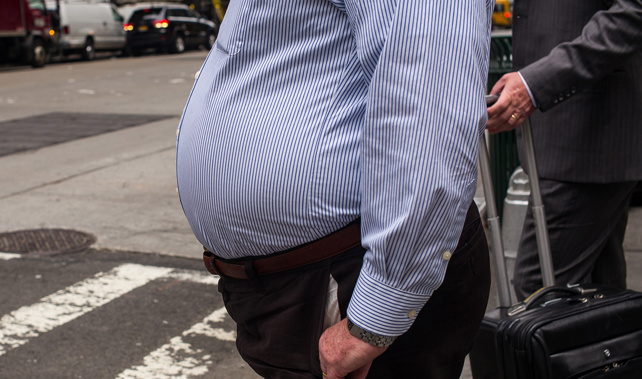
One hundred thousand more New Zealanders are predicted to become severely obese over the next decade.
Shocking new figures released today show countries around the globe inching towards a fatter future with nearly half of the world's population expected to be overweight by 2025.
And New Zealand is no exception.
The World Obesity Federation warns the number of severely obese New Zealanders is expected to balloon from 222,300 to 325,700 in the space of 10 years on current trends.
The number considered overweight is also expected to rise from 2,202200 to 2,663,700 people.
The federation defines severe obesity as those with a BMI greater than 35 and overweight with a BMI greater than 25.
By 2025 there are expected to 177 million adults globally deemed severely obese and in need of treatment.
This has led the World Obesity Federation to urge governments to take immediate action over the "unsustainable" health epidemic.
"The obesity epidemic has reached virtually every country worldwide and overweight and obesity levels are set to continue to rise," said federation president Professor Walmir Coutinho.
"If governments hope to achieve the World Health Organisation target of keeping obesity at 2010 levels then the time to act is now."
The federation is calling for restrictions on advertising food to children and the introduction of taxes on sugar-laden food and drink.
There is also a call for governments to introduce and expand screening and health services for those needing treatment for weight issues.
Federation director of policy Dr Tim Lobstein said common risk factors such as soft drink consumption and sedentary working environments had increased over the past decade while fast food advertising continued unchecked.
"Governments should take a number of actions to help prevent obesity, including introducing tough regulations to protect children from the marketing of unhealthy food, ensuring schools promote healthy eating, strengthening planning and building rules to ensure safe neighbourhoods, encouraging workplaces to offer and promote healthy food choices and physical activity and introducing taxes and subsidies to make healthier food cheaper and unhealthy food more expensive."
Auckland University population health expert Professor Boyd Swinburn said the prognosis was grim for many young New Zealanders, with the rate of childhood obesity continuing to climb.
"For New Zealand the situation is bad. We are leaving our next generation of kids with a terrible legacy."
Prof Swinburn blamed the rise in obesity on a combination of factors including environments leading to weight gain and Government inaction.
"Every single authoritative report on this says we need to have comprehensive policies and action aimed at improving food environments, introducing taxes on sugar, restricting junk food marketing to kids and adopting healthy food policies in schools," he said.
It was also important to mobilise entire communities to adopt healthy lifestyles.
Take your Radio, Podcasts and Music with you









